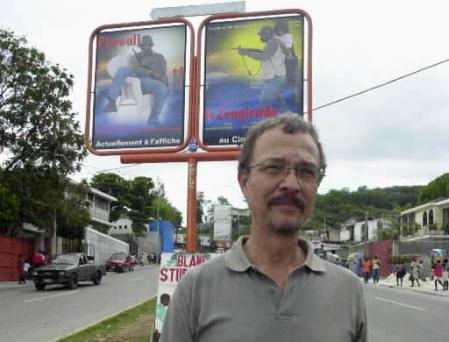| Want to send this page or a link to a
friend? Click on mail at the top of this window. |
Local Films Beat Hollywood in Haiti
By Michael Norton, Associated Press Writer
PORT-AU-PRINCE, Haiti, May 15 (AP) - A new visual art form is budding in Haiti, known
mostly for its naif art and flamboyantly painted buses known as "tap-tap"
jitneys.
Low-budget Haitian movies have become the rage, sometimes drawing bigger audiences than
Hollywood blockbusters like "Planet of the Apes" and "Harry Potter and the
Sorcerer's Stone.
"Our cinema is embryonic, but full of potential," said filmmaker Arnold
Antonin, 57. "Haitians don't want to be invisible. They want to see themselves and
their problems portrayed on the screen.
| Filmmaker Arnold Antonin (right) in
front of his video poster in the street of Port-au-Prince, Haiti, April 19, 2002.
Antonin is to be honored May 24 at the Cannes Film Festival, during the directors
Fortnight. (AP / Photo Daniel Morel)
Perhaps
Antonin's most heralded work is "Courage of Women," a 2000 documentary that
lovingly portray the harsh lives of two sisters. They break rocks and sell them to
builders to support their families, including unemployed young male relatives who consider
their drudgery demeaning.
The
documentary and its director are to be honored May 24 at the Cannes Film Festival.
The
first Haitian film was shot in 1962 - a documentary about a beauty contest, But I am
Beautiful," by Ricardo Widmeier and Edouard Guibaud. Fifteen years later, Bob Lemoine
|
 |
| directed the country's first feature-length film, a 16mm romance called
"Olivia," about a peasant girl who falls in love with a city slicker. |
Other movies were few and far between under the stifling 29-year dictatorship of
Francois and Jean-Claude Duvalier.
After a popular uprising toppled the dictatorship in 1986, Antonin returned to his
homeland after 23 years' exile in Europe and Venezuela.
He had already made several 16mm documentaries on political subjects. But Haiti, in an
economic downturn since 1980, was too poor technologically to produce 16mm films.
Facilities to buy, develop and edit film still don't exist in the Caribbean nation.
In the past 20 years, seven movie houses have shut down in the area around the capital,
Port-au-Prince. Only four remain.
So filmmakers have turned to video, which is cheaper.
In the past 15 years, about 20 feature-length video movies have been shown, drawing
crowds despite their poor lighting, awkward camera work, amateur actors and stilted French
dialogue. Most are lurid domestic dramas and love stories with names like "Afraid to
Love" and "The Choice of My Life."
Antonin made several documentaries, four about Haitian artists, before he tackled his
first feature-length film last year. With a script by Haiti's most prominent novelist,
Gary Victor, the satiric comedy "Piwoli and the Gangster" won critical and
popular acclaim.
But the film, like its characters, faced hurdles. The cultural center run by Antonin
was burglarized. Equipment he had accumulated over 10 years was stolen. The self-financed
movie cost about $25,000, and the actors and technicians — as well as Antonin and
Victor — were not paid. Though the film was shot in two weeks, it took three months
to edit because of daily electrical outages.
Still, at its release in February in adjacent rooms of the Imperial Theater, Haiti's
premier movie house, 350 people watched "Piwoli and the Gangster" while only 50
opted for "Planet of the Apes," which opened at around the same time. Over two
months, Antonin's movie drew 30,000 moviegoers; "Harry Potter" drew 10,000 over
a similar period.
"`Piwoli' shows cinematic prowess. It is proof we can make great films with small
means," said art historian Michel-Philippe Lerebours.
Patrons pay 60 Haitian gourdes — about $2.50 — at a top movie house such as
the Imperial, and about $1 at others.
"It makes me laugh and kills my stress. It is a true image of Haitian
foibles," said Gilbert Saint-Fleury, 25, who saw "Piwoli" 10 times. Piwoli
is a former soldier who lives in suburban comfort but whose boastfulness leaves his dreamy
wife cold. He lets her use his new car and wonders, What more does she want? One day, a
gunman holds her up and drives away in the car, leaving her stunned — and in love.
She is impressed by his impeccable French and the piercing eyes visible through his mask.
Piwoli, mourning the loss of his car and frustrated by his wife's indifference, places
an ad in the paper defying the gangster to come and steal her too.
Disguised as a U.S. Embassy employee, the gangster turns up at the Piwoli home,
hoodwinks the husband, puts sleeping powder in the couple's drinks and struts off with the
unconscious wife slung over his shoulder.
When the scene ended in a moviehouse in St. Marc, on Haiti's west coast, an engaged but
angry audience rose to its feet shouting: The moviegoers found Piwoli's humiliation
unacceptable and threatened to boycott Antonin productions if Piwoli wasn't given a chance
to take revenge.
"After that experience, we added 'To Be Continued' to the end," said Antonin.
Copyright © 2002 The Associated Press.
| Wehaitians.com, the scholarly journal of
democracy and human rights |
